Introduction to Dental Implants
The person who has lost teeth regains the ability to eat virtually anything, knowing that teeth appear natural and that facial contours will be preserved.
Implants are titanium posts that are surgically placed into the jawbone where teeth are missing. These metal anchors act as tooth root substitutes. The bone bonds with the titanium, creating a strong foundation for artificial teeth. In addition to serving as a firm base for teeth, implants also help preserve facial structure, preventing bone deterioration that occurs when teeth are missing.

What Are Dental Implants?
The titanium post acts as an artificial tooth root, which is crucial for maintaining jawbone integrity. Once placed, the implant begins a process known as osseointegration, where the bone grows around and bonds with the titanium, creating a stable foundation. This process can take several months, but it is key to the durability and strength of the implant.
The second component, the prosthetic crown, is custom-made to match the color, shape, and size of your natural teeth, ensuring that it blends seamlessly with your smile.
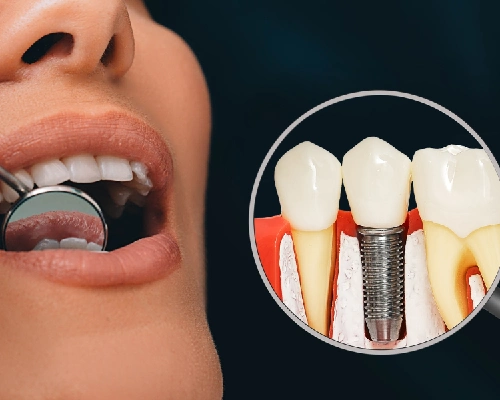
Dental implants can be used to replace a single tooth, multiple teeth, or even a full arch, with the added benefit of not requiring support from adjacent teeth, unlike traditional bridges. They are the closest option to natural teeth in terms of appearance, feel, and function, allowing for normal eating, speaking, and smiling without the worry of slipping or discomfort that can occur with dentures.
Overall, dental implants represent a long-term investment in oral health, offering a permanent solution for tooth loss that not only enhances cosmetic appeal but also promotes the overall health of the jaw and oral cavity.
Types of Dental Implants
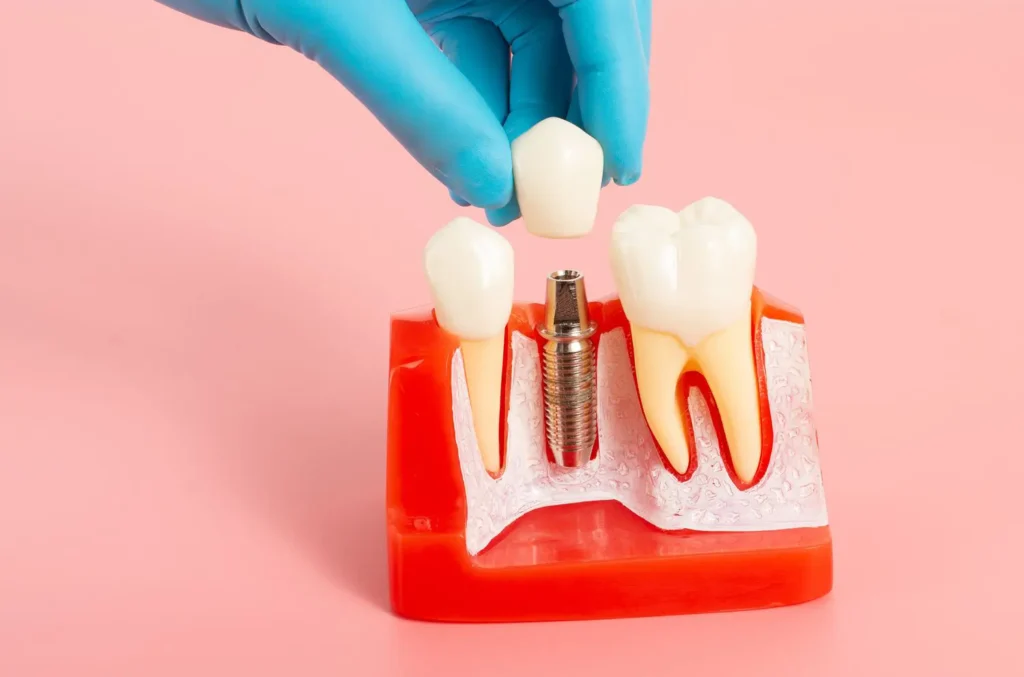
Endosteal Implants
Subperiosteal Implants
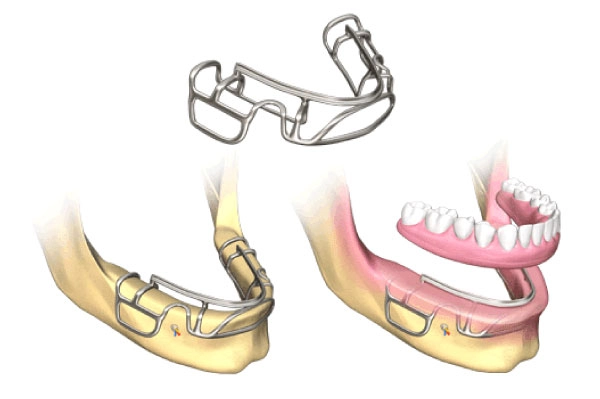
All-on-4® Implants
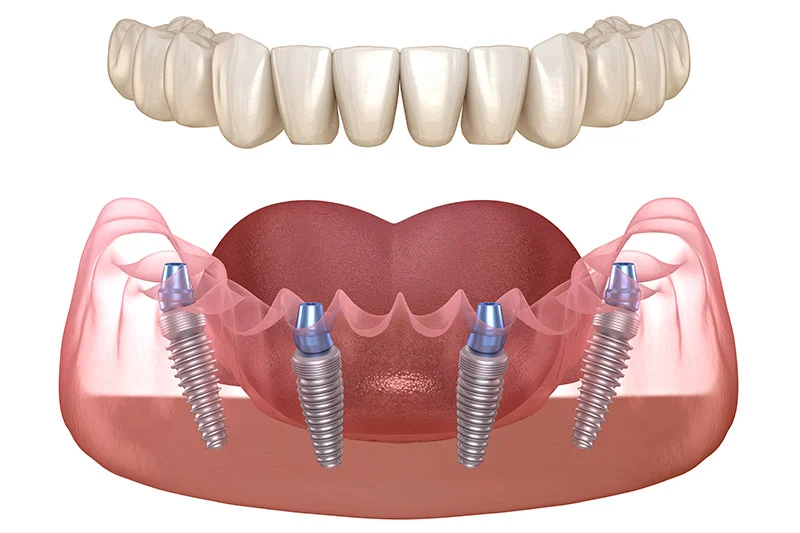
Mini Implants (MDIs)
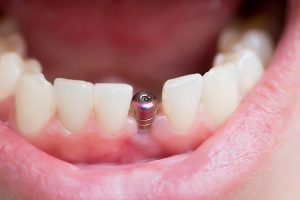
Zygomatic Implants
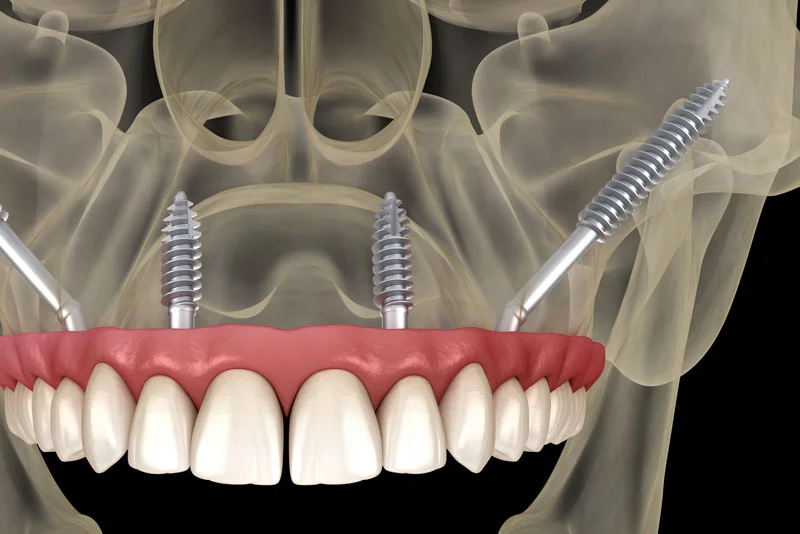
Immediate Load Dental Implants
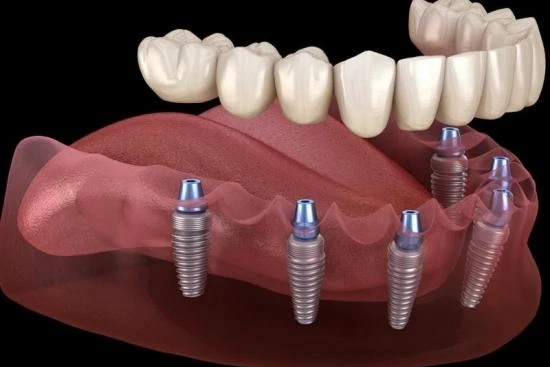
Implant-supported Bridges

The Benefits of Dental Implants

-
Improved Appearance
Dental implants look and feel like your own teeth. Because they are designed to fuse with bone, they become permanent, greatly enhancing one's smile and overall facial aesthetics.
-
Enhanced Comfort
Implants eliminate the discomfort of removable dentures as they become part of you, thereby avoiding the inconveniences of denture slippage or irritation.
-
Easier Eating
Sliding dentures can make chewing difficult. Dental implants function like your own teeth, allowing you to eat your favorite foods with confidence and without pain.
-
Improved Speech
Poor-fitting dentures can slip within the mouth, causing you to mumble or slur words. Implants allow you to speak without the worry that teeth might slip.
-
Better Oral Health
Unlike a tooth-supported bridge, dental implants don't require reducing other teeth. Because nearby teeth are not altered to support the implant, more of your own teeth are left intact, improving long-term oral health. Individual implants also allow easier access between teeth, improving oral hygiene.
-
Durability
Implants are very durable and will last many years. With good care, many implants last a lifetime.
-
Convenience
Removable dentures are just that; removable. Dental implants eliminate the embarrassing inconvenience of removing dentures, as well as the need for messy adhesives to keep them in place.
-
Bone Health
Implants preserve natural bone and stimulate bone growth. When you lose teeth, you also tend to lose bone mass in your jaw. Dental implants can help maintain the jawbone structure.
-
Supports Facial Structures
Dental implants prevent the facial sagging and premature aging that often occur with tooth loss and the resultant bone loss.
-
Psychological Benefits
The psychological impact of dental implants can be profound as they restore the ability to bite, chew, and speak with ease, along with restoring a natural smile, thus boosting self-esteem and confidence.

Are You a Candidate for Dental Implants?
-
Healthy Gums
Candidates must have healthy gums free of periodontal disease. Gum health is crucial for the success of implants, as the tissues in your mouth support and surround the implant structure.
-
Adequate Bone
A sufficient amount of bone is required to anchor the implants in the jaw. Patients who have experienced bone loss may still be candidates, but may require bone grafting prior to the implant procedure.
-
Good Oral Hygiene Practices
Candidates should commit to rigorous oral hygiene. Regular brushing, flossing, and dental check-ups are vital to the long-term success of dental implants.
-
Overall Health
General health needs to be good enough to undergo routine dental surgery. Chronic illnesses, such as diabetes or leukemia, may interfere with healing after surgery and may affect the decision to proceed with implants. Smokers or those who heavily consume alcohol may also face complications and are often advised to quit prior to the procedure.General health needs to be good enough to undergo routine dental surgery. Chronic illnesses, such as diabetes or leukemia, may interfere with healing after surgery and may affect the decision to proceed with implants. Smokers or those who heavily consume alcohol may also face complications and are often advised to quit prior to the procedure.
-
Non-Smokers or Willing to Quit
Smoking can impede healing in the mouth and can decrease the success rate of dental implants. Quitting smoking will be advised for the best outcome.
-
No Uncontrolled Bruxism
Patients who clench or grind their teeth may be at risk of placing too much pressure on the implants, potentially causing long-term damage. Such habits need to be well-managed before proceeding.
-
Patience for the Process
Getting dental implants is often a months-long process that requires several visits to the dentist or oral surgeon. Candidates must be prepared for this time commitment.
-
Realistic Expectations:
While dental implants have a high success rate, it's important for candidates to have realistic expectations regarding outcomes, care requirements, and the possibility of future revisions or replacements.
-
Age Considerations
Most adults are eligible for dental implants, although they are typically not placed in children or adolescents whose jawbones have not yet fully developed.
If dental implants are deemed suitable for you, they can offer a permanent solution to tooth loss and significantly improve your oral health and quality of life.
The Dental Implant Procedure


-
Initial Consultation
The journey begins with a comprehensive dental exam, including X-rays or 3D images, and a review of the patient's medical history. This is to ensure that dental implants are a suitable option, considering factors such as bone density and overall oral health.
-
Treatment Planning
A customized treatment plan is developed, tailored to the patient's specific situation. This plan takes into account factors such as how many teeth need to be replaced and the condition of the jawbone.
-
Tooth Extraction (If Necessary):
If the damaged or decayed tooth is still present, it will be extracted to make way for the implant.
-
Bone Grafting (If Required)
For patients with insufficient jawbone, a bone graft may be necessary to provide a solid foundation for the implant. This can add several months to the process as the graft must heal before the implant can be placed.
-
Placement of the Implant
Once the jawbone is prepared or healed, the dental implant post, which is made of titanium and shaped like a screw, is placed into the jawbone. Over the next several months, the implant will fuse with the bone in a process known as osseointegration.
-
Abutment Placement:
After the implant bonds with the jawbone, a second minor surgery is often required to place the abutment, which is the piece where the crown will eventually attach. Sometimes, the abutment is placed at the same time as the implant.
-
Placing the Crown
Once healing is complete and the abutment is in place, impressions of the mouth and remaining teeth are taken to create the crown. The crown, made to match the patient's natural teeth, is then attached to the abutment.
-
Follow-Up Visits
Regular dental visits are scheduled to monitor the implant, abutment, and crown, ensuring they are functioning properly.
The result is a durable and stable replacement that looks, feels, and functions like a natural tooth, providing patients with long-term benefits and improving their overall quality of life.
Aftercare and Maintenance of Dental Implants
Immediate Post-Operative Care:
- Follow the dentist’s instructions carefully regarding rest, medication, and oral hygiene to facilitate healing.
- Manage swelling and discomfort with cold compresses and prescribed pain relief.
- Stick to soft foods and gradually reintroduce harder foods as healing progresses.
Oral Hygiene:
- Brush at least twice a day with a soft-bristled brush and a non-abrasive toothpaste to avoid scratching the crown or implant.
- Floss daily using implant-specific floss or flossers to remove plaque from around the implant.
- Consider using an interdental brush to clean hard-to-reach areas around the implant.
Regular Dental Check-Ups:
- Schedule regular dental check-ups and cleanings, typically every six months, although some patients may need more frequent visits.
- Professional cleaning is important to remove plaque and tartar buildup that can lead to gum disease, which is detrimental to implant health.


Avoid Damaging Habits:
- Avoid chewing on hard items such as ice, hard candy, or pencils, which can damage the crown.
- If you grind or clench your teeth at night, consider getting a custom-made nightguard to protect the implants and crowns from excessive pressure.
Lifestyle Considerations:
- Smoking can interfere with the healing process and long-term health of dental implants. Quitting smoking is highly recommended.
- Maintain a balanced diet to support overall health, which is beneficial for gum and bone health around the implants.
Recognize and Address Problems Early:
- Be aware of the signs of potential issues, such as persistent pain, swelling, or loosening of the implant or crown. Contact your dentist if you notice any of these symptoms.
Risks and Considerations for Dental Implants
-
Surgical Risks:
Infection: There is a risk of infection at the implant site, which can affect the surrounding tissue and bone.
Nerve damage: Improper placement of implants can lead to nerve damage, resulting in numbness, tingling, or pain in your natural teeth, gums, lips, or chin.
Sinus problems: For implants in the upper jaw, there's a risk of protruding into the sinus cavities, potentially causing sinus-related issues.
-
Integration Failure:
Osseointegration Failure: The process where the implant integrates with the jawbone might fail, resulting in a loose implant that may need to be removed.
Bone Graft Rejection: If a bone graft is necessary, there is a slight chance that the graft could fail to integrate with the existing bone. -
Long-Term Risks:
Peri-Implantitis: This is an inflammatory disease similar to gum disease, which can lead to the loss of bone around the implant and its eventual failure.
Mechanical Failures: Breakage of the implant or the crown can occur, although this is rare with modern materials and techniques.
Aesthetic Issues: Sometimes, the final aesthetic outcome may not be as desired, especially if there is significant bone loss that affects the gum contour. -
Health-Related Considerations:
Chronic Conditions: Patients with chronic illnesses, such as diabetes or leukemia, may not be ideal candidates, as these conditions may impede healing after surgery.
Smoking: Smoking can significantly decrease the success rate of implants due to its impact on healing and bone integration. -
Lifestyle Considerations:
Maintenance Commitment: A commitment to meticulous oral hygiene and regular dental visits post-implantation is critical for long-term success.
Financial Investment: Dental implants can be costly and are sometimes not covered by dental insurance plans.
Cost and Financing Options for Dental Implants in India
Cost Factors
-
Number of Implants: The more implants you require, the higher the overall cost.
Type of Implants and Prosthesis: Advanced implants and custom prosthetics can be more expensive.
Additional Procedures: Bone grafts, sinus lifts, or gum treatments add to the cost.
Geographical Location: The cost may also vary depending on where in India the procedure is performed, with metropolitan cities often being more expensive.
Dentist’s Expertise: Experienced and well-regarded implantologists may charge more for their services.
Cost-Effective Quality Care
India is known for providing cost-effective dental care without compromising on quality. Many clinics in India are equipped with the latest technologies and staffed by well-trained professionals.
When considering implants, it’s also important to think of them not just as a cost, but as an investment in your health and quality of life.
Cost Transparency
Financing and Payment Options
EMI Plans: Some dental clinics offer installment plans that allow you to pay for your implants over time.
Medical Loans: Banks and financial institutions offer medical loans specifically for procedures like dental implants.
Consultation
It is important to have a detailed consultation with your dental professional to understand the full scope of the costs involved and to discuss the various payment or financing options available to you.
Your dentist can also help you understand the long-term benefits and savings that come from choosing dental implants, such as their durability compared to other restorative options.

